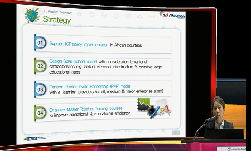The Basic Skills Report for California Community Colleges (2007) stresses the importance of comprehensive training and development opportunities for all faculty (tenured and part-time), administrators and staff members who work with underprepared stu...
http://chineseinput.net/에서 pinyin(병음)방식으로 중국어를 변환할 수 있습니다.
변환된 중국어를 복사하여 사용하시면 됩니다.
- 中文 을 입력하시려면 zhongwen을 입력하시고 space를누르시면됩니다.
- 北京 을 입력하시려면 beijing을 입력하시고 space를 누르시면 됩니다.
California Basic Skills Initiative (BSI) Regional Networks as Self-Sustaining Communities of Practice.
한글로보기https://www.riss.kr/link?id=T13048702
- 저자
-
발행사항
[S.l.]: University of California, Los Angeles 2011
-
학위수여대학
University of California, Los Angeles
-
수여연도
2011
-
작성언어
영어
- 주제어
-
학위
Ed.D.
-
페이지수
127 p.
-
지도교수/심사위원
Adviser: Christina A. Christie.
-
0
상세조회 -
0
다운로드
부가정보
다국어 초록 (Multilingual Abstract)
The Basic Skills Report for California Community Colleges (2007) stresses the importance of comprehensive training and development opportunities for all faculty (tenured and part-time), administrators and staff members who work with underprepared students. With such a large number of academically underprepared students entering the community college system, the ESL/Basic Skills Professional Development Grant (2008) was developed by the California Community College Chancellor's Office (CCCCO) in 2008 to address the fact that few of the 100,000 faculty, administrators, and staff of the California community colleges had received any type of preparation or training to address the needs of basic skills students at the classroom, program, or institutional level. The ESL/Basic Skills Professional Development Grant Progress Report (2009) outlines the considerable need for faculty to learn and practice effective teaching strategies used in the classroom with a diverse group of students at various academic levels. The objectives for the ESL/Basic Skills Professional Development Grant are centered on establishing communities of practice to address faculty needs across regions, institutions, and classrooms in order to impact student success.
The goal of my four regional network case studies was to understand the role of the regional coordinators in facilitating the original BSI regional networks into communities of practice, to understand the impact the network has had on student success, and to identify the critical elements a regional network must possess in order to sustain itself once the regional coordinator position is eliminated. In interviewing the regional coordinators, BSI campus coordinators, and 3CSN leadership team members over a three-week period, I have summarized the characteristics and practices of the regional networks.
The Bay Area Regional Network information is not included in chapter 4 nor in chapter 5, due to the limited responses from the participants. After several attempts to contact BSI campus coordinators and the North Bay Area RC, the study focused primarily on Los Angeles, Sacramento/Central Valley and San Diego. The information collected on the Bay Area is included in Appendix F.
This study adds to the literature on communities of practice at the postsecondary level. Communities of practice traditionally have been implemented in the business sector, online or at a particular school site location for a specified time period. It is unique that the 3CSN regional networks are not isolated to a particular location or group of individuals. The findings show how the networks have emerged from a vision, through various degrees of implementation, to the current focus-driven agenda, and how that agenda affects sustainability and elimination of the regional coordinators. The recommendations from these case studies provide a framework for future CoP to be developed into a network of support for faculty, staff, and administrators across the California community colleges and ultimately improve student outcomes and build student success.
분석정보
연관 공개강의(KOCW)
-

Education Policy at the Party Conferences
Teachers TV Teachers TV -

Further Education: Work Experience
Teachers TV Teachers TV -

Alcohol Education: Here's What We Want
Teachers TV Teachers TV -

2014 이러닝 국제 콘퍼런스 : What is the Lessons from Education Support Project~
한국교육정보진흥협회 Boseon, Kim -

Personal Finance Education: The Money Quiz
Teachers TV Teachers TV






